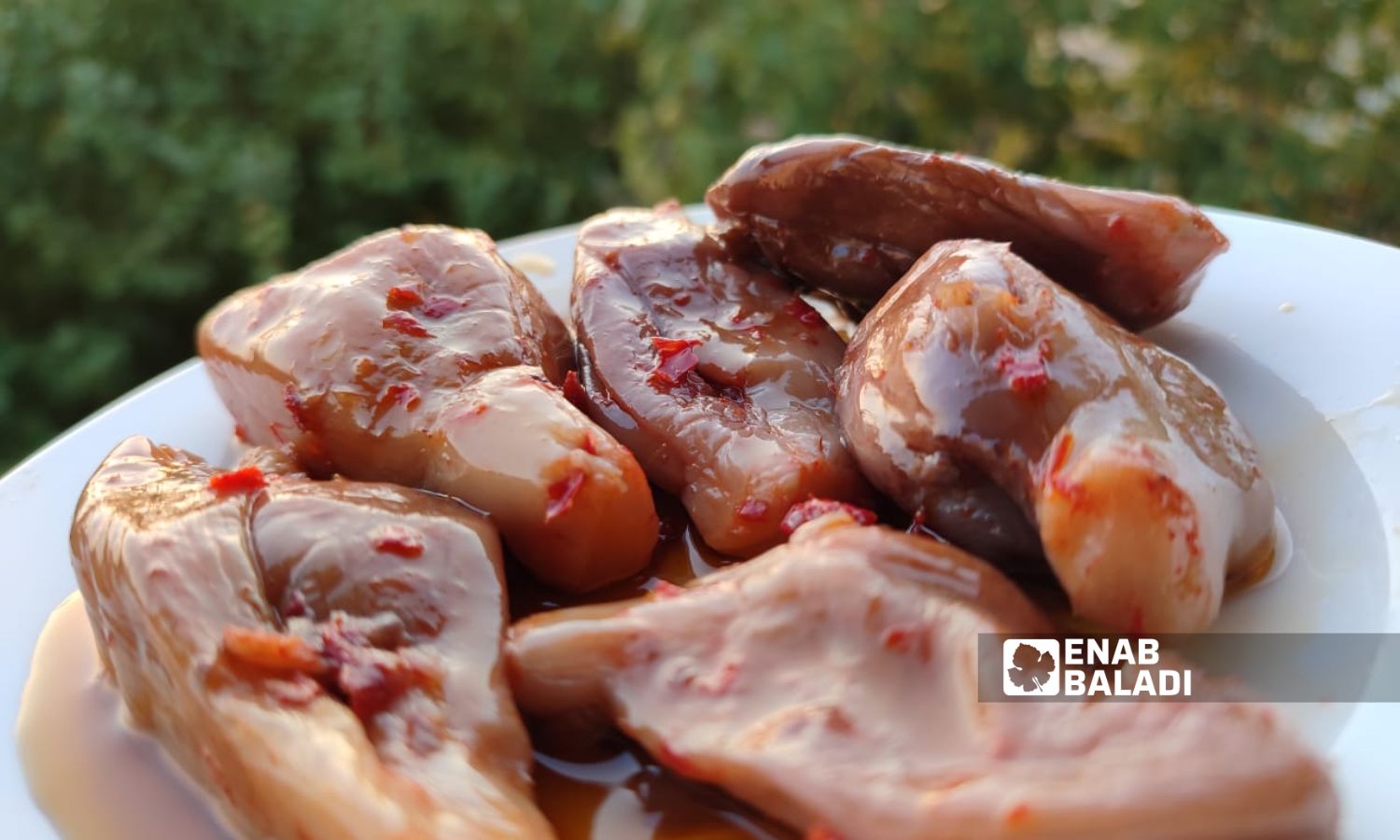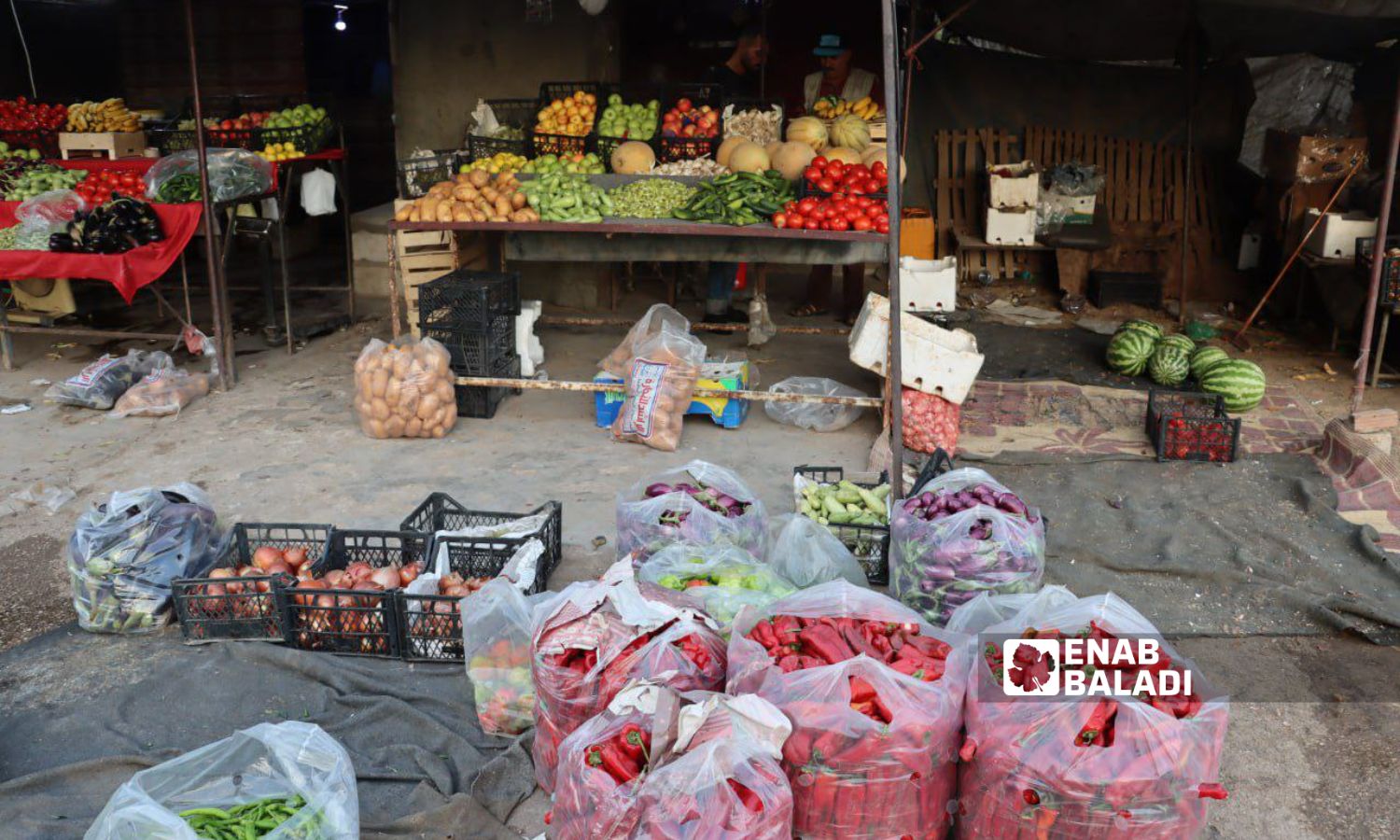



Enab Baladi – Jana al-Issa
At the beginning of last August, the 36-year-old Yara visited the vegetable market in the Qannis neighborhood in the coastal Latakia city to buy materials for preparing the supplies of the Makdous dish, but the high prices at the time did not help her to do so, which made her delay her decision to prepare supplies this year until the prices decrease.
At that time, the price of a kilo of eggplant was 2,500 Syrian pounds, and the price of pepper was between 3,000 and 3,500 Syrian pounds, while the price of walnuts reached about 95,000 Syrian pounds, a liter of olive oil reached 50,000 Syrian pounds, and a kilo of garlic reached 22,000 Syrian pounds.
At the beginning of September, the woman’s expectations of a decrease in prices did not come true. On the contrary, they increased in different proportions, which made her completely refrain from the idea of preparing Makdous, as the price of eggplants rose today to 3,300 pounds, peppers to between 4,000 and 6,000 pounds, walnuts to 130,000 pounds, and a liter of olive oil to 75,000 pounds.
The US dollar is trading at 13,100 SYP according to the S-P Today website, which covers the trading rate of the Syrian pound to the dollar. At the start of the revolution in 2011, the dollar was trading at 47 pounds.
The presence of many foodstuffs on the tables of Syrians has declined over the past years in various areas of control due to the decline in the standard of living and income they suffer from and the inability to meet many basic needs.
Makdous supplies, despite their importance in Syrian homes, are no longer met with the same demand due to the high prices of the materials involved in making them, including eggplant, red peppers, oil, garlic, and walnuts, which forced many families to abandon preparing their supplies of the material or to replace the materials with other less expensive materials.
Because of the high cost of olive oil, many families resort to replacing it with vegetable oil, while some women may prefer to fill the eggplants with pistachios instead of walnuts due to the price difference between the two materials.
| Makdous is a dish of oil-cured aubergines and is a part of Levantine cuisine. |

Hala al-Mohammad, 56, a woman residing in the western countryside of Daraa, told Enab Baladi that it is indispensable to make the Makdous dish, as it is a main item in the breakfast meal.
However, due to the high cost, the quantities of supplies this year will be less than the quantities of the previous year, as last year she prepared approximately 200 kilograms of eggplants, while this season she will prepare only 100 kilograms.
The high prices of olive oil and the price of a tin (16 liters), reaching about one million Syrian pounds, forced the woman to replace it with vegetable oil, as the price of a liter of vegetable oil is about half the price of a liter of olive oil.
Among the things that al-Mohammad intends to rely on, in order to reduce the cost of Makdous supplies is the use of third-class walnuts in terms of quality.
There are three varieties in the city’s markets that vary in quality. The best type is sold for 100,000 pounds per kilogram, 85,000 pounds for the average type, and 70,000 pounds for the lowest quality type.
The selling prices of garlic witnessed a noticeable increase, as the price of a kilo reached 30,000 pounds, while last year its price did not exceed about 5,000 pounds.
Bushra, 46, a teacher who lives in the tourist Slanfeh town in the Latakia countryside, also decided to reduce the amount of food supplies this year by half, in addition to changing and manipulating its contents, she told Enab Baladi.
The woman replaced the walnuts with peanuts as the price of one kilo of which ranges between 40,000 pounds and 50,000 pounds, and with olive oil vegetable oil, and the price of one liter ranges between 23,000 pounds and 30,000 pounds, which could reduce the cost slightly.
Bushra is thinking about preparing 25 kilos instead of the 50 kilos she prepared last year, expressing her fear that her family will not accept the taste of Makdous with peanuts, while they are accustomed to eating it with walnuts.
Suhail, 35, a farmer in the western countryside of Daraa, sells his crop of eggplant and red pepper every year directly to the locals without the need to put it on the market.
The farmer explained to Enab Baladi that the demand for purchasing Makdous items this year is weaker than in previous years due to the rise in prices, as the price of a kilo of eggplant and pepper reaches about 3,000 pounds.
Wael, 42, an engineer in a government institution in the city of Latakia, faced a “bitter trade-off,” as he described it. The amount he saved from his part-time work was sufficient to cover either his two children’s school supplies or the Makdous supplies.
His choice fell on school supplies, “There are no Makdous supplies this year because we, the oppressed by society, can no longer afford its costs,” Wael told Enab Baladi.
Last year, Wael’s family prepared 25 kilos of Makdous at a cost that did not exceed 150,000 Syrian pounds at the time, and today, if the family wants to prepare it, its cost would exceed 500,000 Syrian pounds, as the engineer explained.
Elham, 48, who works as a housekeeper in Latakia, decided to cancel the idea of preparing Makdous supplies this year, as she is a mother of four young people and there is no breadwinner for her family other than herself after the death of her husband, and what she gets is barely enough for their daily food, according to what she told Enab Baladi.
A few days ago, Elham received a call from one of her clients, who calls her for work whenever she comes on summer vacation from her place of residence in the Emirates, where she works. The woman asked her to prepare the Makdous supplies for her, and she would send her a money transfer sufficient for her wages in addition to preparing the Makdous supplies for the two families together.
“It was a call of relief,” Elham describes the situation. She said that she received a transfer worth 3,250,000 pounds, so she bought 100 kilos of eggplant, 50 for the expatriate woman, and 50 for herself, and began her preparations to prepare supplies.
After the most recent increase in mid-August, the minimum salaries for public sector workers in areas controlled by the Syrian regime reached 185,940 Syrian pounds, while the average cost of living is about 55 times the minimum wage, according to statistics and specialized reports.
Last August, the average cost of living for a Syrian family of five members, according to the Qasioun Cost of Living Index, exceeded 10.3 million Syrian pounds, while the minimum cost of living reached about 6.5 million Syrian pounds.
The living situation in regime-controlled areas is not much different from the situation in the northwest and northeast of Syria, where the controlling parties differ.
Living is affected by the level of income on the one hand and the rise in prices that haunts everyone, which is also affected by many factors, most notably the value of the currency in which it is traded.
Kolestan Darwish, a resident of the city of Qamishli, a housewife and mother of four children, told Enab Baladi that her family depends on the salary of her husband, who works as a driver in the municipality.
Darwish said that in previous years, she used to prepare Makdous in large quantities, but this year, she will prepare it differently and will not be able to prepare more than 25 kilos of eggplants.
Darwish explained that she will buy the entire quantity of eggplants this month, boil them, and freeze them in the home refrigerator in order to preserve them for as long as possible without filling them, explaining that she will wait to prepare the filling in stages for the coming months until the season ends.
Saeed Mulla Khalil, a vegetable trader in the vegetable market in the city of Qamishli, told Enab Baladi that the demand for buying eggplant this year is lower than in previous years, attributing the matter to the rise in prices.
The average price of a kilo of eggplant is about 5,000 pounds, the price of a kilo of walnuts is about 140,000 pounds and 25,000 pounds for one kilo of red pepper in the markets of various towns in northeastern Syria.
The residents of the region live in deteriorating living conditions similar to the different areas of influence over Syria geography, while the areas controlled by the Kurdish-led Autonomous Administration are considered the richest in Syria, as they include most of the oil wells, in addition to being described as “Syria’s wheat reservoir,” in view of the big agricultural activity in the northeastern region.
The people of the region continue to protest to demand the improvement of their living conditions and the provision of fuel. Previously, demonstrations took place to demand raising salaries, improving living conditions, and securing some basic food items in the region’s markets.
The minimum salary for employees working in institutions affiliated with the Autonomous Administration is one million and 40,000 Syrian pounds, according to the latest increase approved by the Administration on August 27.
In northwestern Syria, the Makdous supplies are beyond the capacity of many people who do not have the means.
Iman al-Abd, 43, a supervisor in a school affiliated with the Turkish Religious Endowment, who receives a monthly salary of about $150, told Enab Baladi that she wants to prepare 15 kilos of Makdous supplies this year because her family relies heavily on this material.
As a result of the high prices of materials, al-Abd will resort to stuffing part of the Makdous with walnuts and another part without it, and she may also dispense with olive oil.
The price of a kilo of walnuts in northwestern Syria ranges between 75 TL and 120 TL, depending on their quality. The price of a liter of olive oil is about 110 TL, and the price of a kilo of garlic is around 50 TL.
According to the Turkish Döviz website, which specializes in exchange rates and currencies, the exchange rate of the US dollar reached 27 Turkish liras.
The unemployment rate continues to rise in Idlib and its countryside, with the absence of economic projects, war conditions, and the targeting of markets and public facilities.
Daily labor wages in the region range between 40 TL and 70 TL and vary according to the number of working hours and the nature of the profession, such as agriculture, manual labor, or construction work.
Enab Baladi’s correspondent in Latakia, Linda Ali, contributed to this report.
if you think the article contain wrong information or you have additional details Send Correction